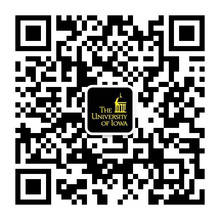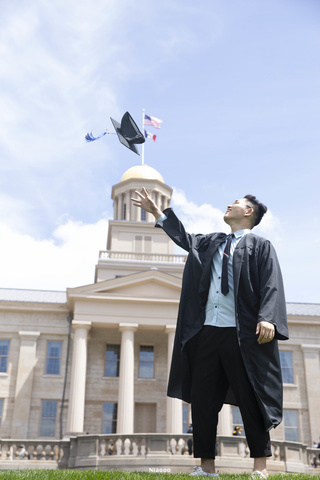Welcome!
This page will help parents, guardians, and other family members of University of Iowa international students gain a better understanding of the rules, processes, and services available while your son or daughter studies at the University of Iowa.

Pre-arrival Information and Planning
- Information for New Students - This page is also useful for parents, and explains everything from how students apply for visas, arrange transportation to Iowa, apply for housing, meal plan options, shipping belongings to Iowa City, orientation, etc. Parents are also welcome to sign up for any of our live pre-arrival webinars or view past recorded webinars.
- Office of Admissions - Information for the parents of newly admitted students, contains tips on helping parents prepare for the college experience.
- Iowa City/Coralville Area Convention and Visitor Bureau - Excellent resource on hotels, restaurants, and other businesses, places to visit, things to do in the area. Includes the ability to translate the website into several languages.
- Eastern Iowa Airport and Transportation to Iowa City - We encourage students to fly into the Eastern Iowa Airport between Iowa City and Cedar Rapids. Transportation services are then available to take students from the airport to any address they specify in the Iowa City area. Reserving transportation is strongly recommended - the airport is a small regional airport located in the countryside, and transportation is not always immediately waiting or available. ISSS also recommends accepting transportation only with official sources listed on the airport website. While sometimes private individuals or organizations offer rides to new international students, we cannot guarantee the safety of these individuals nor their insurance status. Some individuals will attempt to charge new students excessive amounts of money for transportation, which others may attempt to pressure students to join their organizations during the ride to Iowa City. Our advice for safety and security is to travel using an official company listed on the airport website.
Contact Us
Email: Parents who have any questions or concerns about their students may contact ISSS via email at isss@uiowa.edu. Emails may be sent in the language of your choice and ISSS will take care of any translations if necessary.
UI WeChat: scan the WeChat QR code below with your smartphone or search for the UI in WeChat.

Facebook: Connect with us on the ISSS Facebook page.
Parents and Privacy of Student Information
In the U.S. several laws exist that protect the information of college students as well as medical/mental health information. This can sometimes be a confusing concept for some parents who are accustomed to having direct access to information in the systems at home. Other parents may wonder why they cannot have access to this information as they are the ones paying the bills. Nevertheless, the University of Iowa and ISSS must strictly follow the requirements of these laws or risk severe legal penalties.
The Family Educational Rights and Privacy Act (FERPA) dictates what rights students have regarding their educational records, and also restricts what others can access. The law applies equally to domestic as well as international students, and prevents parents from getting information regarding grades and academic performance, the university bill, and financial aid. The only exceptions where sensitive information may be released is for a health or safety emergency. However, parents may be granted permission by the student to access grades and billing information in the MyUI system.
Parent Access to MyUI - MyUI is the campus records system that your student will use to manage all aspects of their student life on campus. They will report local address and phone information, register for classes, view the UBill, apply for housing, see grades as well as mid-semester academic reports, and connect to campus organizations. Parents may be granted a "guest account" by the student so that they can view the class schedule, grades, and the UBill. Please note that the university cannot provide this directly due to FERPA laws (see the next section), the student must provide the parent with access to the guest account.
Another federal law in the U.S. that applies to everyone, citizens and non-citizens alike, is the Health Insurance Portability and Accountability Act, or HIPAA. HIPAA closely protects health and mental health information so that it cannot be released to anyone other than the individual being treated, unless that individual provides consent. This means that parents are not able to contact campus health offices such as Student Health and Wellness or University Counseling Services to get information on a student's treatment, or even whether the student is a patient there. It is possible, however, for students to sign a form with their health provider giving consent to release information. An exception where the HIPAA restrictions can be bypassed is when there is a risk to the health and safety of the student or another.
The University of Iowa has a range of support services and resources for supporting students' mental health. There is also a page dedicated to addressing the needs of UI's international community.
International Student and Scholar Services oversees the immigration records of those here on a University of Iowa student immigration document I-20 or DS-2019. This information is also protected, but students may give permission for ISSS to share information on their immigration situation, provide copies of immigration documents, and other immigration-related details by submitting an information release consent form via our iHawk system.
Billing and How to Pay
Extensive information on the university bill and making payments may be found on the University Billing website. Useful things for parents to be aware of:
- The U-Bill is generated on the first of each month and then becomes available in MyUI, with payment due on the 22nd of each month. Parents may access the U-Bill if students give them guest account access as described above.
- Tuition, fees, housing, and meals may be paid in one bill each semester, or students may sign up for the deferred payment plan and make three payment installments through each semester.
- Methods to pay the U-Bill include personal check, cashier's check or money order, or by bank payments online. Credit cards are not accepted for U-Bill payments.
- International payments may be made through the company Flywire. The UI has partnered with Flywire to make wire transfers in your home currency from your bank to the UI easy.
- If a student is late with payments, a hold on the ability to register for the next semester as well as to use the student ID card for purchasing books or food may be placed until the bill is paid.
Safety and Support for International Students
International Student and Scholar Services, along with many other offices and programs, strives to create a safe and supportive environment on campus for our international students. Students are always encouraged to come to ISSS if they are experiencing any difficulties, challenging situations involving others, or struggling with potential health or mental health issues. We can help connect students with the appropriate offices on campus that can provide further professional assistance.
- Hawk Alert - The University of Iowa's automated emergency alert system to notify students, staff, and faculty about safety issues on campus.
- University Police - The UI's campus police department that handles law enforcement and safety issues for the university, as well as safety education programs.
- Nite Ride - The university's free late-night transportation service available to all students, staff, and faculty, operated by the campus police department, for students who do not feel safe walking home from campus at night.
- University Counseling Service - The university's clinic to provide mental health services and support for students. Staffed by professional psychologists, including many who were once international students themselves, the UCS has provided considerable support for international students struggling with issues such as homesickness, depression, sadness, and anxiety. They are also very adept at working with students for whom counseling may not be normally sought in their home culture.
- Student Health and Wellness - The campus student health clinic that provides basic medical care such as immunizations, medical prescriptions, some diagnostic tests, psychiatric services, support for drug and alcohol addiction, nutritional information, and numerous educational programs. In short, the clinic students will visit when they don't feel well. The program works in conjunction with University of Iowa Hospitals and Clinics, one of the top hospitals in the U.S., when necessary. Special information for parents or guardians is available on their website.
- Mental Health - The University provides this website dedicated to supporting students' mental health while at Iowa. There is also a page specifically dedicated to our international community.
- Dean of Students Care and Assistance Program - The office of the Dean of Students offers special support for students and their families when unexpected and serious situations arise, including hospitalization and medical emergencies, death of a family member, natural disasters. They work closely with other offices such as ISSS to assist students and their families at times of difficulty.
- Threat Assessment Team/Assessment and Care Team - The Threat Assessment Program is dedicated to the early identification, assessment and management of incidents and behaviors that threaten the safety and well-being of the university community. Can assist ISSS and other offices in reaching out to students when there are concerns about safety or mental health issues.
- Code Blue Phones - Emergency telephones strategically placed around campus. A single push of the illuminated button summons UI police officers, allows dispatchers to hear the situation, and triggers the bright blue strobe light at the top of the phone kiosk.
- Student Legal Services - Student Legal Services provides high quality, free advice and affordable legal representation for currently enrolled University of Iowa students. Licensed attorneys and legal interns assist students on a variety of topics such as housing leases and disputes with landlords, alcohol or driving offenses, consumer issues, and also referrals to specialized attorneys when necessary. Student Legal Services partners with ISSS to provide an introduction to their services for new students during international orientation week.
- Office of Admissions: Keeping Students Safe and Healthy - Additional links on health and mental health resources, campus safety, and the annual Campus Security Report.
Academic Success and Expectations
Many services exist on campus to help support students to succeed academically. However, it should be noted that students will need to take initiative to seek and attend services, they are not made mandatory by the university. This is one area where parents support and encouragement can help if you believe your student is struggling academically.
ISSS has a guide that can help you understand key values of the U.S. higher education system, including academic honesty, academic planning, and study skills.
Oversees program to intervene early when students are struggling academically, provides several tutoring and supplemental instruction study sessions, and runs the Academic Resource Center. It also operates the Excelling@Iowa program that includes the Success at Iowa online introduction course required of all new undergrad students, a survey of new students several weeks into the first semester to help assess and identify those who may be distressed or struggling, and organizes outreach to those students. The university also gathers information mid-semester on students who are not attending classes, or who are receiving a grade of D or F, so that outreach can be done to those students as well.
The University of Iowa requires all students to maintain a minimum grade point average during the course of their students. Each college may have a different minimum requirement, as do some individual majors.
- If a student's grade point average drops below that minimum, the college will notify the student that they are on "Academic Probation," which means their grade point average is too low, but they will be permitted to enroll again in the next session in order to have the chance to bring it back up.
- However, if a student still is not able to improve the grade point average after the next semester, they may be placed on "Academic Dismissal." This is typically a restriction from attending the University of Iowa for one year, with the opportunity to return after one year if the college grants permission.
- Academic Dismissal will impact those here on a student visa, as maintenance of the visa depends on being a full-time student. However, many international students who experience Academic Dismissal choose to attend another U.S. school, such as a local community college, during that year so they can continue to work on their academics and improve their grades and study habits. If they can demonstrate improvement over the course of that year, the University of Iowa may then permit them to again enroll. Other students decide to return home to take a break and reassess their readiness for the U.S. higher education system. International students may not, however, simply remain in the U.S. if not enrolled full-time at a college, university, or community college. ISSS will work with students who are academically dismissed about their immigration options and the deadlines involved.
U.S. higher education values honesty in academics, which includes knowing and using ways to properly cite and reference the works of others and how to conduct oneself in the classroom and while preparing classwork. The University of Iowa is very serious about academic misconduct, and may issue warnings for first offense, but the may also permanently expel students who engage is serious academic misconduct. This information is covered for new and continuing students at length, so students are very aware of it. The problem is some students fail to "believe it," or risk that "no one will find out" or that the consequences will not be serious if they engage in misconduct. See examples of academic misconduct as well as potential consequences.
Other Resources
- International Parent of the Year - Each year International Student and Scholar Services recognizes an "International Parents of the Year" based on nominations from current international students. An award plaque is presented to parents and an article is written for the the International Programs news site.
- Parent & Family Network - Part of the Office of the Vice President for Student Life, the network provides information for the families of all UI students. Although the network's primary focus is on domestic families, there is still much useful information for international parents. It also includes an excellent guide on "University Lingo" that helps explain some of the abbreviations or other campus-specific terms you may hear from your students.
- Visiting the University of Iowa - Parents who accompany students to orientation, or visit at any time of the year, can find useful resources such as campus maps, parking and transportation, and other information for visitors to the University of Iowa.
- Giving to the University of Iowa - Donating to the University of Iowa to help create scholarships and support programs.
- Iowa Hawk Shop - Order University of Iowa clothing, accessory, and gifts for your student - and for you!
Getting Involved on Campus
Our experience as well as research shows that students who get involved in activities on and off campus do better academically and socially. As the Office of Student Financial Aid reports, "While you may think working as a student will take time away from your academics, studies show that students who work 20 hours or less per week statistically do better in school on average than their non-working peers (Noel-Levitz, 2010). Also, students who are “connected” to campus report a higher satisfaction with their college life, graduate in higher numbers, and graduate more quickly. UI research shows that on-campus student employment makes a significant difference in retention rates and graduation rates.
There are many ways for students to get involved:
- International Student Life and Activities - Information on community organizations such as Friends of International Students, international/domestic student friendship programs such as Friends Without Borders, student organizations such as the Organization for the Active Support of International Students, and links to the Center for Student Involvement and Leadership.
- Pomerantz Career Center - Helps students connect with employment opportunities on campus as well as internship opportunities later as well as post-graduation employment. Partners with ISSS each semester to offer an employment series focusing on topics such as how to write a resume to apply for work with a U.S. employer, what to expect during a job interview, and information on post-graduation employment visas.
Graduation and Beyond

- Graduation Ceremony Translations - Each fall and spring semester International Programs coordinates translations of certain graduation ceremonies where large numbers of our international students are participating. This helps family and friends at home enjoy and celebrate the ceremony when they can't travel here in person. Translated languages include Chinese, Farsi, Spanish, Arabic, and Korean.
- Post-Graduation Employment - Those on student visas who graduate are often eligible for a period of post-graduation employment experience in the U.S. Students on an F-1 visa may choose to apply for Optional Practical Training (OPT), which gives them the ability to work anywhere in the U.S. in a job relating to the degree they just earned. Students on a J-1 visa may apply for Academic Training, which is similar to OPT.
- Alumni Association - Your students can remain in touch with the University of Iowa long after they graduate! An increasing number of alumni groups and events meet abroad.